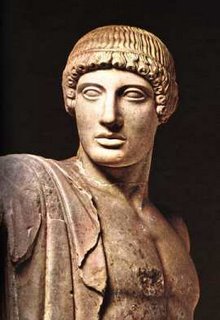Ante Diem V Idus Februarias

Modern Date : February 9th
Ante Diem V Idus Februarias
Fifth Day to the Ides of February
This is one of the dies nefasti a day on which no legal action or public voting could take place. The dies nefasti of February were days of religious ceremony honoring the dead and heralding the rebirth of the Spring and its associated fertility.
Eratosthenes, a Greek mathematician, philosopher, poet, astronomer, and director of the Alexandrian Library, asserted that the world was round and correctly measured the size of our world 200 hundred years before the birth of Christ. In his library was an ancient book by Aristarchus of Samos who also asserted the world was round long before such knowledge was acceptable.
February is a month sacred to the gods Mars (as Quirinus, or Romulus) and Juno, the wife of Jupiter.Juno (Hera) was the mother of Mars, called Ares by the Greeks, and sometimes Enyalius. Ares was often accompanied in his bloody campaigns by Enyo, the murderess goddess of war who was known as Bellona by the Romans. Ares paid no attention to which cause was right or wrong and was concerned only with where he could cause maximum carnage.
February is also a month in which particular reverence was shown to the spirits of deceased ancestors. This was a month devoted to fertility, both of men and women, and of the land.
Mercury exits Aquarius
On this day Mercury exits Aquarius and enters Pisces, where he is said to be "in detriment," his quickness and clarity much impaired by the water and dense fog of Pisces. This time around, Mercury's uncomfortable swim with the fishes will be very long, as he "goes retrograde" in Pisces (3/2), then "direct" (3/25), and does not finally get out of the water and into the fire of Aries until 4/16. Until then, be prepared to deal sympathetically with Mercurial types who not only wonder if they've lost a step or two, and feel like they're wading through late-winter slush all the time, but even fear this slow tempo and labored legwork is permanent. It isn't.
Festival of Apollo
In Greece, on this day they celebrated the Festival of Apollo. This is the feast day of Apollo in his aspect as Helios, god of the Sun. This day, a week after the mid-winter festival, heralds the emergence of new light from the dark and cold of winter.
Apollo was called by the same name in Rome where they dedicated a temple to him. Apollo was the son of Jove (Jupiter) and Latona. Apollo was the brother of Diana, and was the god of archery, music, poetry, and healing. He was also called Phoebus Apollo. On his birth at Delos, Apollo was acclaimed by all the gods and the island was covered with golden flowers and encircled with swans. As soon as he tasted the ambrosia of his nurse Themis, he suddenly grew to full youth and demanded a lyre and a bow. He announced that his fathers will would be presented to the world through his oracular lyric poetry. Apollo then began to play and to "step high and featly" as became his style of dance. Apollo's temple was at Crisa below Mount Parnassus in Phocis.
St Apollonia
Another third century martyr, Apollonia was a deaconess whose teeth were knocked out during the tortures which led to her death, thus she is invoked against toothache and her symbol is a forceps gripping a tooth. As her name suggests her feast day replaced the Festival of Apollo, in the Catholic Church's take over of Paganism.
Ashura
In the Islamic calendar, this 10th day of the month of Muharram is Ashura, a day of fasting and thanksgiving that commemorates God's intervention to save the prophet Moses from the wrath of Pharaoh.
